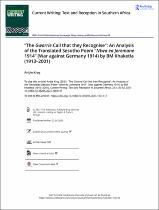“The Gwarrie Call that they Recognise”: An analysis of the translated Sesotho poem “Ntwa ea Jeremane 1914” (War against Germany 1914) by BM Khaketla (1913–2001)
Abstract
This essay looks at a recently translated poem, “Ntwa ea Jeremane 1914”, written by BM Khaketla, as a lens through which to approach the feelings and attitudes of people from Lesotho towards the world wars. A poem is sometimes described as a gathering of spoken or written words, arranged in such a way that it evokes an intense imaginative alertness around an issue, an emotion or an experience. Investigations into the participation of black South Africans in the world wars mainly rest on official archival documentation, with attention focused on the racial, socio-economic context and the post-war treatment of soldiers. Distinction is seldom made between black South Africans and those from Lesotho (or Swaziland or Botswana) as they were all drafted under the South African contingents. There has been little discussion in South African art about why black people joined the Allied forces during the world wars, with the prominence of the sinking of the SS Mendi a wonderful exception as it reverberates in SEK Mqhayi's famous poem, “Ukutshona kuka Mendi”, as well as Fred Khumalo's recent novel, Dancing the Death Drill (2017). The visual artist William Kentridge has also commemorated the death of very large numbers of black Africans in the First World War in his powerful exhibition, The Head and the Load. This article explores the expression of emotions and conclusions about the world wars in a poem by Khaketla, as well as the techniques he uses to carry these across larger vistas.

